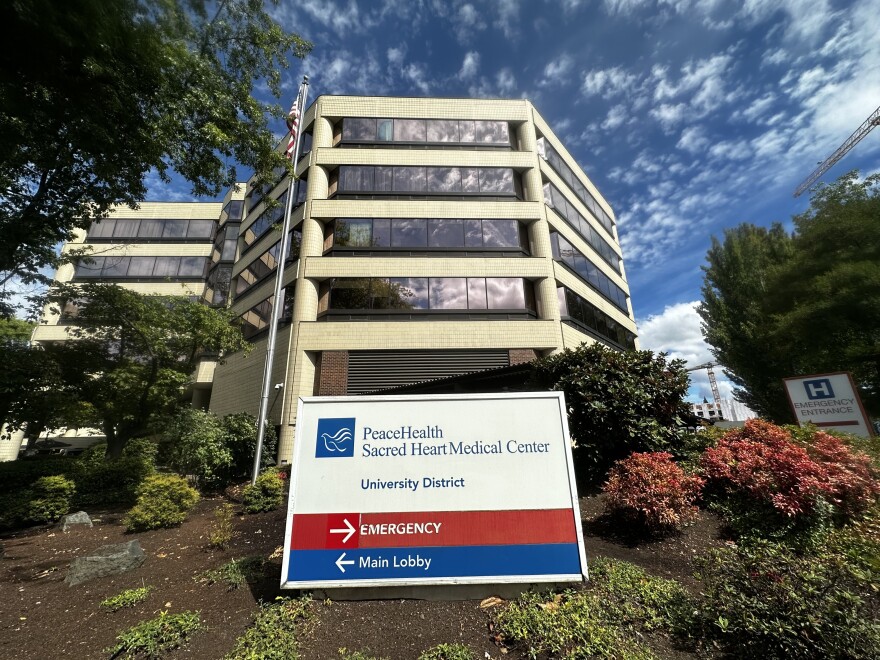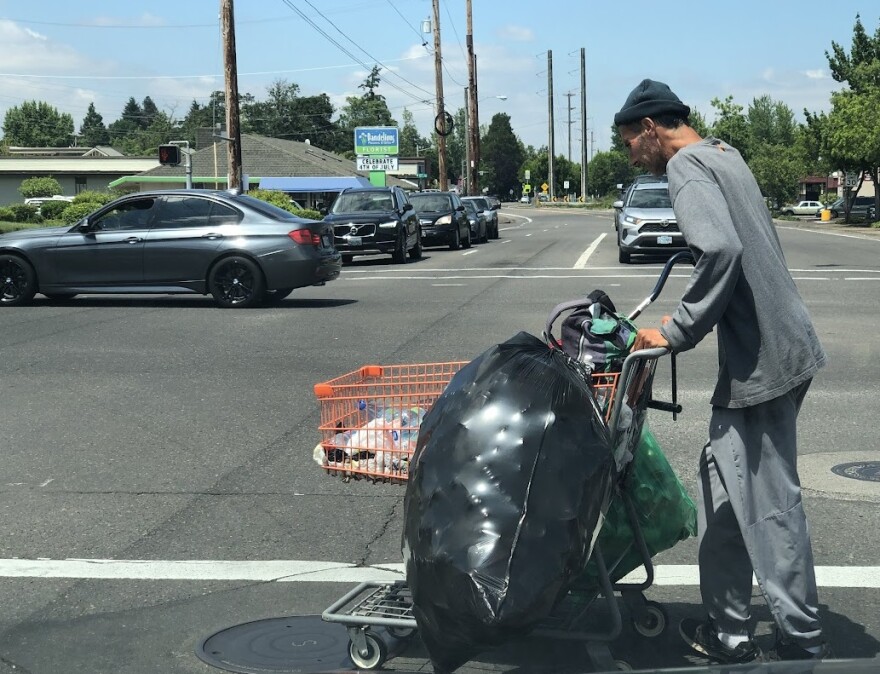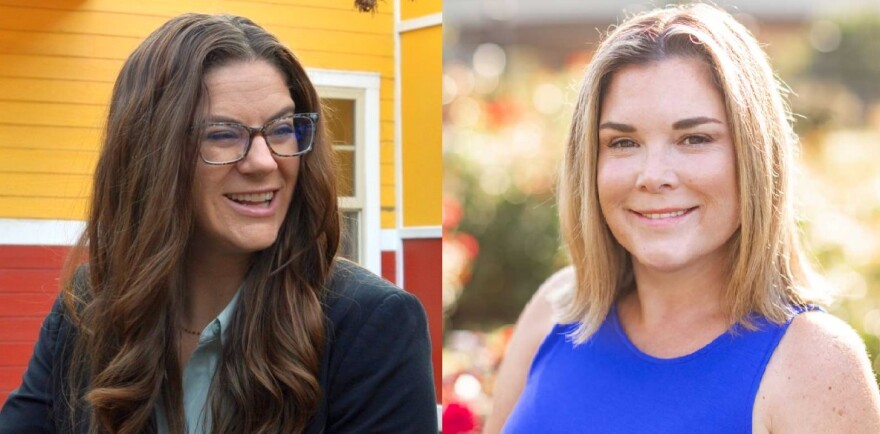Voters in Eugene’s Ward 7 will decide in November whether to keep their current city councilor, or replace her.
In the May primary, Lyndsie Leech and Barbie Walker were the top two vote-getters, though neither had 50% support, prompting this runoff.
In a three-way race, Leech held a 16-point lead over Walker, a sizable advantage she hopes to repeat this fall. Leech was appointed to Ward 7 last winter, after a recall election ousted Claire Syrett from office. Ward 7 includes portions of downtown Eugene and the Skinner Butte area, as well as parts of the River Road corridor.
The candidates on the issues
KLCC emailed each candidate five questions on several major issues affecting Eugene. Here are their responses, which have been lightly edited for style but not for content:
Questions for Ward 7 Candidate Lyndsie Leech
Lyndsie Leech is the executive director of WellMama, an organization dedicated to the mental well-being of families, and has lived in Eugene for nearly 15 years. Groups she’s worked with include Looking Glass Community Services, The Child Center, HIV Alliance, and Food for Lane County. Leech earned a Master of Public Administration from Middlebury Institute of International Studies in Monterey, CA and a graduate certificate in Public Health from Oregon State University.
1 – It’s been 10 months since you were sworn in as an interim councilor. In your time serving Ward 7, what’s your proudest -or most important- achievement voters should know about?
LL: I am proud of the opportunities that I have been able to take to protect or stand up for the residents of my ward. I passed an emergency measure to end industrial noise pollution that was greatly affecting people in the River Road area, stood strong on renter protections, voted in various projects that will help house our people, and pushed forward items on our Climate Action Plan, particularly those that impact public health. But voters should know that to learn deeply about many of the issues that are facing our community, that being on City Council, running a campaign, working full time and raising a family is incredibly challenging, but that I do this because I care deeply about my community and all of the people in it and will continue to work hard on the tough things that we are facing.
2 – Homelessness remains a pressing concern, even as the economy improves and the pandemic is not as much of a concern as it was over the last three years. What needs to be done to effectively address the high numbers of unhoused people in the city?
LL: It is true that the economy has improved since the pandemic, but cost of living has sky-rocketed and the majority of people are feeling the strain. Rents are frankly astronomical. I believe that we need to keep creating opportunities for housing units to be built. Yes, affordable housing needs to be prioritized, but any type of housing will help us to address the shortage of units that we need to stabilize prices and have enough spaces to house our population. At the council level over the past year, we have voted to invest $50 million into downtown with the priority being housing, we are about to vote on another urban renewal package that would support millions of dollars of investment into housing and projects in the Riverfront. We have approved HOME funds to support several affordable housing developments throughout the city. We need to continue that momentum and come up with creative ways that we can add additional housing units into our city - incentivizing ADUs for example. That being said, we must continue to support our shelters and services for our unhoused population.
3 – PeaceHealth says it plans to close its hospital in the University District. How do you regard this issue? Should the city find ways to keep a hospital in that location?

LL: I am very dismayed by the prospect of the closure of the University District hospital and emergency room. In particular I am very concerned about the behavioral health unit that gives our community access to behavioral health crisis workers and on-demand psychiatric assessments and care. I am confident in our Fire Chief (Mike) Caven and City Manager (Sarah) Medary, that they are doing all that they can to not only meet the extreme challenge of diverting thousands of emergency room admissions to RiverBend, but also that they will keep advocating for a delay in closure and finding alternatives to keeping a hospital in that location. At the Council level, we are being kept up to date on the developments there - if there is anything that we are able to do, I would support investing whatever resources are available to be able to continue to operate a fully-functional hospital system at that location.
4 – The Ems baseball team is still trying to get funds to cover a new stadium, while pickleball remains popular. Where do you stand on creating a multi-use athletic facility in Eugene? How should it be funded?
LL: I do want to see investments made to support affordable community gathering and recreational spaces in our community. I love the idea of additional sports facilities, I support the Ems, pickleball, and other projects. However, I fully understand the constraints of our city budget, and we have many important priorities for investments, like we talked above about housing. The option for a bond is being considered, and as we continue to learn new information, I look forward to continuing the conversation on whether that will have the level of community support needed or if it is even possible, or if there are other options available to us.
5 – Now that the Eugene City Council has withdrawn the ban on new natural gas hookups, what's the next step in the fight against climate change?
LL: The next steps in the fight against climate change include utilizing federal dollars for an incentive program for replacing gas infrastructure in current homes and other ways that individuals can help lower our carbon emissions. We are looking heavily into alternative fuels, creating industrial development standards for heavy polluting industry, planning for electric vehicle charging and looking at development standards for gas stations. We will continue to come back to council looking at ways that we can move towards a future of a reduction in fossil fuel use.
Questions for Ward 7 Candidate Barbie Walker
Barbie Walker is owner of the Pint Pot Public House, a member of the Junior League of Eugene, and former board president of the University District Business Association. She developed the 4J ID program for at-risk and homeless youth of Eugene, and pushed for the passage of Oregon House Bill 2402, which established a grant program through the Oregon Health Authority to help unhoused people get free copies of their birth certificates. Walker has a Bachelor Degree of Science from the University of Oregon, with a major in biology and a minor in chemistry.
1 – Lyndsie Leech has been a counselor for Eugene’s Ward 7 for nearly a year now. Why should you take over that role?
BW: The importance of having someone in a city councilor seat breaks down to the basic ability to accurately represent The People of Eugene. What the people of Ward 7 want is to be heard. Ward 7 needs leadership that will LISTEN to the facts and present a STRONG, accurate voice at the council table for them, to get things done.
I have lived in Eugene for over 20 years. I went to school here. I have rented apartments or homes here. I have bought my home here. I have businesses here. I have over 10 years of extensive local volunteerism with proven measurable outcomes for our homeless and at-risk youth. I have served on University District Business association board, board president and I have served on Junior League of Eugene board, VP Community Enrichment and VP Finance.
I have attended all Candidate Forums, and I was clearly the candidate who did the research on the city's most pressing topics. I have attended the Ward 7 Local Community Organization Meetings and their Local Fundraisers, and I am clearly the candidate that is available and brought the can-do attitude and that I have solutions.
Importantly, I continue to attend or hybrid into our city council meetings and I have not seen enough measurable progress towards our safety crisis. I have not heard or seen progress towards bringing economic prosperity to working families. People and families who would like to purchase their first home. I have not heard a transparent dialogue regarding the plan and budget for our alternative transportation routes. Especially a plan that pencils out for ridership, our taxpayers, ADA, K-12 students, and our senior citizens. I have solutions.
With my ability to have an open sincere dialogue while wearing many hats to meet people where they are, I am the candidate who presents the transparent, respectful, common sense, solution-oriented representation that the people of Ward 7 have been asking for.
2 – Homelessness remains a pressing concern, even as the economy improves, and the pandemic is not as much of a concern as it was over the last three years. What needs to be done to effectively address the high numbers of unhoused people in the city?

BW : This is a complex question that deserves more time for my answers.
We must start with how this question triages out.
Housing at the top triaged to Builders, Homelessness and Unhoused.
Homelessness triage to: mental health (biological), mental health (drug addiction), Those that want to live or exist within an area but not any type of structure for that life style.
Unhoused triage to: life experiences, medical system/health (bills), veterans, discrimination, homeless at-risk youth, priced out/don’t qualify. Many more instances that can be listed.
Builder’s triages to: supply chain, costs of goods, inflation, city permits, land use, SDC, zoning.
Once the categories are established, we can dissect what are the barriers that perpetuated someone being unhoused or homeless.
If we are simply looking for land use, we must be respectful to our open spaces. Ward 7 houses an abundance of greenery and biodiversity, and we cannot lose sight of the importance of having these spaces preserved for all for years to come.
We have to look at the population density of areas and make sure we are being good stewards to those that have contributed to community in these areas, possibly for generations and not cause overpopulated unsafe areas.
We must look at where our UGB is and work with Lane County on their land use options.
We must look at our older buildings and be able to convert them into housing without the huge permitting and SDC barriers.
If we are looking to homelessness due to mental health, we must reflect on Measure 110 and what we can do to amend this. This measure, although had good intentions, is another pushed through, non-transparent plan that is causing harm by keeping people in their addiction. We need amendments to this measure so council can interpret it in a way that allows citizens to feel safe in their homes and humane outcomes for the homeless population. We need to support the nonprofits that continue to have measurable movement and progress for the homeless and reflect budget wise to those that are not making progress or doing more harm than good. We all have grace for mental health and different life crisis while at the same time we need to feel safe in our neighborhoods and homes.
3 – PeaceHealth says it plans to close its hospital in the University District. How do you regard this issue? Should the city find ways to keep a hospital in that location?
BW: In a city our size that houses a university we must be mindful of the crucial infrastructures that are needed to best serve the residents. As a city grows an infrastructure such as Health Care/Hospital can be developed to grow with it. The development must make sense and serve the purpose of operating for what it is intended for. From what I have researched, one large ER hospital could be developed into serval smaller ERs/Hospitals strategically located throughout Eugene. This development could allow for our General Practices and Urgent Cares to operate for the patients they should be triage for and our ERs to function for patients that are in need of an emergency facility. With that said, there must be a solid plan before Eugene is just completely without a Hospital / Emergency Room.
4 - The Ems baseball team is still trying to get funds to cover a new stadium, while pickleball remains popular. Where do you stand on creating a multi-use athletic facility in Eugene? How should it be funded?
BW: I had an interesting eye-opening meeting weeks ago with my River Road community organization general meeting. During the comment segment regarding the use of the fairgrounds for our Eugene Emeralds there were some naysayers because of budget issues. Mainly people pointing to the need for more funding going towards mental health and homelessness and saving lives, before sports.
I found it very necessary to piggyback on some of their topics with an enlightening change of the tune. My stance is, it would be a tragic, horrible mistake if Eugene lost the Eugene Emeralds and this multi-use facility. I remember when the Emeralds moved from Civic stadium to PK Park, the tears and heartbreak from what seemed to be a loss of Eugene history. Family history. The Eugene Emeralds is a part of Eugene culture.
As a community we must recognize and focus on the fact that this is more than, what comes across as a dismissive slight of it is “just baseball.” This is a part of the life balances within our Community Enrichments.
The Ems do not have the luxury of staying at PK Park anymore. It’s not an option. I pointed out that as Eugene continues to chip away at budget items for things like our Community Organizations, much like the meeting we were having right then, Eugene Celebration, Parades, and the Eugene Emeralds that we are really losing our life balance here in Eugene. These very real human connections are in fact vital to our mental health.
So, let’s look towards the notable fact that Allan Benavides and the crew bring more than “just baseball”. Benavides’ intuitiveness to this community and its family-oriented life enrichments is remarkable. His team is so inventive. Eugene Emeralds brings in and supports things like Relay for Life, kids camps, diversity & culture. As one lady shared, kids summer reading incentives & possibly a stage for up-and-coming musicians, the arts!
The taxes already in place through the Hotel Tax is designed for this. The City of Eugene, Lane Co, MLB & private donors should get invested in appropriate budgeting for this multi-use facility. We need to support each other as this could be a great time to shine for our Community Enrichments.
5 – Now that the Eugene City Council has withdrawn the ban on new natural gas hookups, what's the next step in the fight against climate change?
BW: A motion was made to bring back the NWN Gas ban to council for a 2024 session. It is not off the table. I believe the people of Eugene have proven that they want the right to vote on something as large as Energy Choice. The council needs to look at the reality of being equitable to all while planning for the fight against climate change. As many councilors themselves still have not "electrified" their own homes or cars. Ward 7 has a diverse population; we cannot marginalize people or working families, that cannot afford to change their energy sources in their homes and automobiles within half a generation.
There have been no concessions given to the fact that electric bills will substantially go up, electric cars are actually not that "green" and are out of price range for many, electric drop lines put into homes or business are extremely expensive and not even available, the list goes on and on. There needs to be a solid energy infrastructure plan that includes all the other energy sources in place for the safety and prosperity of our citizens, schools, university, and the businesses we work in and or own. With something as important as climate change this ban is completely lacking factual transparency and will lead to a very poor outcome for this city. This is a ban without a plan.







